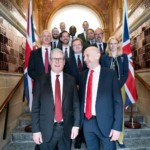Remembering the meaning of remembrance
The intervention of Prince William and Downing Street to compel FIFA to allow the England team to wear poppies during a match rather belies the royal statement that the poppy has ‘no political’ connotations. In fact, wearing the red poppy has never been free of political values, not least because it reinforces the view that war is acceptable, however regrettable.
Currently, its ubiquity in the run up to Remembrance Day feels less and less about genuine reflection on the suffering of individuals caught up in war, and increasingly about showing support for the military as a whole, and its actions.
Celebrities, companies and the media are all playing their part in creating a culture where not wearing the poppy in the public eye is seen as unpatriotic. The FIFA row was even the first item on Children’s BBC Newsround with school children drafted in to show their indignation.
As the ‘lest we forget’ message, which should be core to the act of remembrance, is overshadowed by a celebrity-led and unquestionning reverance, the opportunities for these young people to develop the critical awareness they need to understand the reality of armed conflict will diminish.
See more: ,
Like what you read?
> Sign up for our newsletter or blog notifications
> Support our work – from just £2 a month







